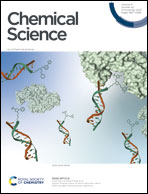A flexible data-free framework for structure-based de novo drug design with reinforcement learning†
Abstract
Contemporary structure-based molecular generative methods have demonstrated their potential to model the geometric and energetic complementarity between ligands and receptors, thereby facilitating the design of molecules with favorable binding affinity and target specificity. Despite the introduction of deep generative models for molecular generation, the atom-wise generation paradigm that partially contradicts chemical intuition limits the validity and synthetic accessibility of the generated molecules. Additionally, the dependence of deep learning models on large-scale structural data has hindered their adaptability across different targets. To overcome these challenges, we present a novel search-based framework, 3D-MCTS, for structure-based de novo drug design. Distinct from prevailing atom-centric methods, 3D-MCTS employs a fragment-based molecular editing strategy. The fragments decomposed from small-molecule drugs are recombined under predefined retrosynthetic rules, offering improved drug-likeness and synthesizability, overcoming the inherent limitations of atom-based approaches. Leveraging multi-threaded parallel simulations combined with a real-time energy constraint-based pruning strategy, 3D-MCTS achieves remarkable efficiency. At a fixed computational cost, it outperforms other state-of-the-art (SOTA) methods by producing molecules with enhanced binding affinity. Furthermore, its fragment-based approach ensures the generation of more dependable binding conformations, exhibiting a success rate 43.6% higher than that of other SOTAs. This advantage becomes even more pronounced when handling targets that significantly deviate from the training dataset. 3D-MCTS is capable of achieving thirty times more hits with high binding affinity than traditional virtual screening methods, which demonstrates the superior ability of 3D-MCTS to explore chemical space. Moreover, the flexibility of our framework makes it easy to incorporate domain knowledge during the process, thereby enabling the generation of molecules with desirable pharmacophores and enhanced binding affinity. The adaptability of 3D-MCTS is further showcased in metalloprotein applications, highlighting its potential across various drug design scenarios.



 Please wait while we load your content...
Please wait while we load your content...